I have the following query, which returns all merchants in the database who have transactions between two given dates.
SELECT distinct me.id, me.merchant_num, me.merchant_nm, count(1) as num_transactions
,CASE WHEN me.status = 'A' THEN 'Yes' ELSE 'No' END as production_mode
FROM merchant_t me
LEFT OUTER JOIN transaction_t tt
ON tt.merchant_id = me.id
AND tt.transaction_dt BETWEEN '2020-04-01' and '2020-04-30'
WHERE me.status = 'T'
GROUP BY me.id, me.merchant_num, me.merchant_nm, me.status
But, there is additional information I need to include in the query. I've written the enhanced query below, but it results in duplicated merchants. I know the query could be written better, but that's the limit of my SQL knowledge.
I need to keep the same number of results as the above query.
SELECT distinct me.id, me.merchant_num, me.merchant_nm, count(1) as num_transactions
,CASE WHEN me.status = 'A' THEN 'Yes' ELSE 'No' END as production_mode
-- additional information needed as below, with comments
-- the date of the last transaction that uses IBank (IBA)
,(select max(transaction_dt)
from transaction_t where merchant_id = me.id
and tt.bank_txt = 'IBA') as last_ibank_transaction
-- the value of the "trans_live" column for the merchant's most recent transaction
,(select top 1 trans_live
from transaction_t
where merchant_id = me.id order by transaction_dt desc) is_live
FROM merchant_t me
LEFT OUTER JOIN transaction_t tt
ON tt.merchant_id = me.id
AND tt.transaction_dt BETWEEN '2020-04-01' and '2020-04-30'
WHERE me.status = 'T'
GROUP BY me.id, me.merchant_num, me.merchant_nm, me.status, tt.bank_txt
This returns duplicated merchants. In the screenshot below, I have filtered on a single merchant to show the duplication. The first result set is from the original query. The second is from the updated query. "DISTINCT" does its job but I only want to see one merchant record.
There are two tables involved:
merchant_t
----------
id merchant_num merchant_nm status
transaction_t
--------------
id merchant_id transaction_dt trans_live bank_txt
EDIT
I am trying to avoid having the dates inside a subquery
VARUN'S ANSWER
The updated query returns many duplicates as below.
SQL SCRIPT
USE [XYZ]
GO
/****** Object: Table [dbo].[merchant_t] Script Date: 6/10/2020 5:23:51 PM ******/
SET ANSI_NULLS ON
GO
SET QUOTED_IDENTIFIER ON
GO
CREATE TABLE [dbo].[merchant_t](
[id] [int] IDENTITY(1,1) NOT NULL,
[merchant_num] [nvarchar](50) NULL,
[merchant_nm] [nvarchar](100) NULL,
[status] [nchar](1) NULL
) ON [PRIMARY]
GO
/****** Object: Table [dbo].[transaction_t] Script Date: 6/10/2020 5:23:51 PM ******/
SET ANSI_NULLS ON
GO
SET QUOTED_IDENTIFIER ON
GO
CREATE TABLE [dbo].[transaction_t](
[id] [int] IDENTITY(1,1) NOT NULL,
[merchant_id] [int] NULL,
[transaction_dt] [datetime] NULL,
[trans_live] [bit] NULL,
[bank_txt] [nvarchar](30) NULL
) ON [PRIMARY]
GO
SET IDENTITY_INSERT [dbo].[merchant_t] ON
GO
INSERT [dbo].[merchant_t] ([id], [merchant_num], [merchant_nm], [status]) VALUES (335, N'PriceBusterDVD_NZ_AN', N'Pricebuster NZ ANZ', N'T')
GO
INSERT [dbo].[merchant_t] ([id], [merchant_num], [merchant_nm], [status]) VALUES (341, N'T6400050', N'Merco Test Merchant', N'T')
GO
INSERT [dbo].[merchant_t] ([id], [merchant_num], [merchant_nm], [status]) VALUES (342, N'6400262', N'Musac School Test 1', N'T')
GO
INSERT [dbo].[merchant_t] ([id], [merchant_num], [merchant_nm], [status]) VALUES (366, N'T6400093', N'Paystation Limited Test', N'T')
GO
INSERT [dbo].[merchant_t] ([id], [merchant_num], [merchant_nm], [status]) VALUES (367, N'T6400435', N'PB Technologies Test', N'T')
GO
INSERT [dbo].[merchant_t] ([id], [merchant_num], [merchant_nm], [status]) VALUES (374, N'PriceBusterDVD_NZ_BN', N'Pricebuster NZ BNZ', N'T')
GO
INSERT [dbo].[merchant_t] ([id], [merchant_num], [merchant_nm], [status]) VALUES (389, N'TAirNewZealandNZ_All', N'Test Air NZ - All', N'T')
GO
INSERT [dbo].[merchant_t] ([id], [merchant_num], [merchant_nm], [status]) VALUES (390, N'T6400061', N'The Warehouse Test', N'T')
GO
INSERT [dbo].[merchant_t] ([id], [merchant_num], [merchant_nm], [status]) VALUES (392, N'T6400246', N'University of Waikato Test', N'T')
GO
INSERT [dbo].[merchant_t] ([id], [merchant_num], [merchant_nm], [status]) VALUES (538, N'T6400449', N'NZTA Payments Dev System Testing', N'T')
GO
INSERT [dbo].[merchant_t] ([id], [merchant_num], [merchant_nm], [status]) VALUES (544, N'T6400447', N'NZTA Tolling Dev System Testing', N'T')
GO
INSERT [dbo].[merchant_t] ([id], [merchant_num], [merchant_nm], [status]) VALUES (631, N'SS64000475', N'Smeedi Test', N'T')
GO
INSERT [dbo].[merchant_t] ([id], [merchant_num], [merchant_nm], [status]) VALUES (729, N'T6400048', N'Marram Community Trust Test', N'T')
GO
INSERT [dbo].[merchant_t] ([id], [merchant_num], [merchant_nm], [status]) VALUES (776, N'SS64000665', N'POLi Test Bench', N'T')
GO
INSERT [dbo].[merchant_t] ([id], [merchant_num], [merchant_nm], [status]) VALUES (936, N'T6400002', N'WorldRemit Test NZ', N'T')
GO
INSERT [dbo].[merchant_t] ([id], [merchant_num], [merchant_nm], [status]) VALUES (1033, N'SS64005103', N'Ahura Consulting Limited', N'T')
GO
INSERT [dbo].[merchant_t] ([id], [merchant_num], [merchant_nm], [status]) VALUES (1173, N'SS64005386', N'Warehouse Stationery Test', N'T')
GO
INSERT [dbo].[merchant_t] ([id], [merchant_num], [merchant_nm], [status]) VALUES (1236, N'SS64005423', N'KlickEx Test', N'T')
GO
INSERT [dbo].[merchant_t] ([id], [merchant_num], [merchant_nm], [status]) VALUES (1435, N'T6400477', N'NZMCA', N'T')
GO
INSERT [dbo].[merchant_t] ([id], [merchant_num], [merchant_nm], [status]) VALUES (1580, N'T6400478', N'2 Degrees Mobile - Test', N'T')
GO
INSERT [dbo].[merchant_t] ([id], [merchant_num], [merchant_nm], [status]) VALUES (1626, N'SS64006121', N'Property Council New Zealand', N'T')
GO
INSERT [dbo].[merchant_t] ([id], [merchant_num], [merchant_nm], [status]) VALUES (1714, N'SS64006558', N'ServiceFinder.co.nz', N'T')
GO
INSERT [dbo].[merchant_t] ([id], [merchant_num], [merchant_nm], [status]) VALUES (1972, N'T6400480', N'2 Degrees Mobile Accept Test', N'T')
GO
INSERT [dbo].[merchant_t] ([id], [merchant_num], [merchant_nm], [status]) VALUES (1988, N'T6400484', N'HelloClub Test', N'T')
GO
INSERT [dbo].[merchant_t] ([id], [merchant_num], [merchant_nm], [status]) VALUES (2011, N'T6400482', N'Horowhenua District Council Test', N'T')
GO
INSERT [dbo].[merchant_t] ([id], [merchant_num], [merchant_nm], [status]) VALUES (2260, N'SS64008067', N'Success Global', N'T')
GO
INSERT [dbo].[merchant_t] ([id], [merchant_num], [merchant_nm], [status]) VALUES (2274, N'64007479', N'Samsung Electronics New Zealand', N'T')
GO
INSERT [dbo].[merchant_t] ([id], [merchant_num], [merchant_nm], [status]) VALUES (2397, N'SS64008228', N'MyBitcoinSaver.com', N'T')
GO
INSERT [dbo].[merchant_t] ([id], [merchant_num], [merchant_nm], [status]) VALUES (2418, N'6400478', N'Spark Staging', N'T')
GO
INSERT [dbo].[merchant_t] ([id], [merchant_num], [merchant_nm], [status]) VALUES (2441, N'SS64008239', N'Kiwi Petz', N'T')
GO
SET IDENTITY_INSERT [dbo].[merchant_t] OFF
GO
SET IDENTITY_INSERT [dbo].[transaction_t] ON
GO
INSERT [dbo].[transaction_t] ([id], [merchant_id], [transaction_dt], [trans_live], [bank_txt]) VALUES (18215957, 389, CAST(N'2020-04-01T06:55:37.000' AS DateTime), 0, N'IBA')
GO
INSERT [dbo].[transaction_t] ([id], [merchant_id], [transaction_dt], [trans_live], [bank_txt]) VALUES (18215958, 389, CAST(N'2020-04-01T06:56:13.000' AS DateTime), 0, N'IBA')
GO
INSERT [dbo].[transaction_t] ([id], [merchant_id], [transaction_dt], [trans_live], [bank_txt]) VALUES (18215959, 389, CAST(N'2020-04-01T07:06:47.000' AS DateTime), 0, N'IBA')
GO
INSERT [dbo].[transaction_t] ([id], [merchant_id], [transaction_dt], [trans_live], [bank_txt]) VALUES (18215960, 389, CAST(N'2020-04-01T07:09:09.000' AS DateTime), 0, N'IBA')
GO
INSERT [dbo].[transaction_t] ([id], [merchant_id], [transaction_dt], [trans_live], [bank_txt]) VALUES (18215961, 389, CAST(N'2020-04-01T08:19:28.000' AS DateTime), 0, N'IBA')
GO
INSERT [dbo].[transaction_t] ([id], [merchant_id], [transaction_dt], [trans_live], [bank_txt]) VALUES (18215962, 389, CAST(N'2020-04-01T08:19:45.000' AS DateTime), 0, N'IBA')
GO
INSERT [dbo].[transaction_t] ([id], [merchant_id], [transaction_dt], [trans_live], [bank_txt]) VALUES (18215963, 389, CAST(N'2020-04-01T08:19:57.000' AS DateTime), 0, N'IBA')
GO
INSERT [dbo].[transaction_t] ([id], [merchant_id], [transaction_dt], [trans_live], [bank_txt]) VALUES (18215964, 389, CAST(N'2020-04-01T08:20:16.000' AS DateTime), 0, N'IBA')
GO
INSERT [dbo].[transaction_t] ([id], [merchant_id], [transaction_dt], [trans_live], [bank_txt]) VALUES (18215965, 389, CAST(N'2020-04-01T09:33:40.000' AS DateTime), 0, N'IBA')
GO
INSERT [dbo].[transaction_t] ([id], [merchant_id], [transaction_dt], [trans_live], [bank_txt]) VALUES (18215966, 389, CAST(N'2020-04-01T09:33:46.000' AS DateTime), 0, N'IBA')
GO
INSERT [dbo].[transaction_t] ([id], [merchant_id], [transaction_dt], [trans_live], [bank_txt]) VALUES (18215967, 389, CAST(N'2020-04-01T11:05:35.000' AS DateTime), 0, N'IBA')
GO
INSERT [dbo].[transaction_t] ([id], [merchant_id], [transaction_dt], [trans_live], [bank_txt]) VALUES (18215968, 389, CAST(N'2020-04-01T11:06:13.000' AS DateTime), 0, N'IBA')
GO
INSERT [dbo].[transaction_t] ([id], [merchant_id], [transaction_dt], [trans_live], [bank_txt]) VALUES (18215969, 389, CAST(N'2020-04-01T11:12:51.000' AS DateTime), 0, N'IBA')
GO
INSERT [dbo].[transaction_t] ([id], [merchant_id], [transaction_dt], [trans_live], [bank_txt]) VALUES (18215970, 389, CAST(N'2020-04-01T11:17:38.000' AS DateTime), 0, N'IBA')
GO
INSERT [dbo].[transaction_t] ([id], [merchant_id], [transaction_dt], [trans_live], [bank_txt]) VALUES (18215971, 389, CAST(N'2020-04-01T12:45:13.000' AS DateTime), 0, N'IBA')
GO
INSERT [dbo].[transaction_t] ([id], [merchant_id], [transaction_dt], [trans_live], [bank_txt]) VALUES (18215972, 389, CAST(N'2020-04-01T12:45:49.000' AS DateTime), 0, N'IBA')
GO
INSERT [dbo].[transaction_t] ([id], [merchant_id], [transaction_dt], [trans_live], [bank_txt]) VALUES (18215973, 389, CAST(N'2020-04-01T12:50:17.000' AS DateTime), 0, N'IBA')
GO
INSERT [dbo].[transaction_t] ([id], [merchant_id], [transaction_dt], [trans_live], [bank_txt]) VALUES (18201776, 1580, CAST(N'2020-04-01T14:16:38.000' AS DateTime), 0, N'ANZ')
GO
INSERT [dbo].[transaction_t] ([id], [merchant_id], [transaction_dt], [trans_live], [bank_txt]) VALUES (18215974, 389, CAST(N'2020-04-01T12:59:06.000' AS DateTime), 0, N'IBA')
GO
INSERT [dbo].[transaction_t] ([id], [merchant_id], [transaction_dt], [trans_live], [bank_txt]) VALUES (18215975, 389, CAST(N'2020-04-01T14:18:13.000' AS DateTime), 0, N'IBA')
GO
INSERT [dbo].[transaction_t] ([id], [merchant_id], [transaction_dt], [trans_live], [bank_txt]) VALUES (18215976, 389, CAST(N'2020-04-01T14:18:21.000' AS DateTime), 0, N'IBA')
GO
INSERT [dbo].[transaction_t] ([id], [merchant_id], [transaction_dt], [trans_live], [bank_txt]) VALUES (18215977, 389, CAST(N'2020-04-01T14:26:15.000' AS DateTime), 0, N'IBA')
GO
INSERT [dbo].[transaction_t] ([id], [merchant_id], [transaction_dt], [trans_live], [bank_txt]) VALUES (18215978, 389, CAST(N'2020-04-01T14:33:02.000' AS DateTime), 0, N'IBA')
GO
INSERT [dbo].[transaction_t] ([id], [merchant_id], [transaction_dt], [trans_live], [bank_txt]) VALUES (18215979, 389, CAST(N'2020-04-01T15:12:43.000' AS DateTime), 0, N'IBA')
GO
INSERT [dbo].[transaction_t] ([id], [merchant_id], [transaction_dt], [trans_live], [bank_txt]) VALUES (18215980, 389, CAST(N'2020-04-01T15:12:46.000' AS DateTime), 0, N'IBA')
GO
INSERT [dbo].[transaction_t] ([id], [merchant_id], [transaction_dt], [trans_live], [bank_txt]) VALUES (18215981, 389, CAST(N'2020-04-01T15:41:14.000' AS DateTime), 0, N'IBA')
GO
INSERT [dbo].[transaction_t] ([id], [merchant_id], [transaction_dt], [trans_live], [bank_txt]) VALUES (18215982, 389, CAST(N'2020-04-01T15:43:53.000' AS DateTime), 0, N'IBA')
GO
INSERT [dbo].[transaction_t] ([id], [merchant_id], [transaction_dt], [trans_live], [bank_txt]) VALUES (18223719, 2441, CAST(N'2020-04-02T10:20:03.000' AS DateTime), 0, N'IBA')
GO
INSERT [dbo].[transaction_t] ([id], [merchant_id], [transaction_dt], [trans_live], [bank_txt]) VALUES (18231457, 389, CAST(N'2020-04-02T07:11:32.000' AS DateTime), 0, N'IBA')
GO
INSERT [dbo].[transaction_t] ([id], [merchant_id], [transaction_dt], [trans_live], [bank_txt]) VALUES (18231458, 389, CAST(N'2020-04-02T07:13:06.000' AS DateTime), 0, N'IBA')
GO
INSERT [dbo].[transaction_t] ([id], [merchant_id], [transaction_dt], [trans_live], [bank_txt]) VALUES (18231459, 389, CAST(N'2020-04-02T08:49:33.000' AS DateTime), 0, N'IBA')
GO
INSERT [dbo].[transaction_t] ([id], [merchant_id], [transaction_dt], [trans_live], [bank_txt]) VALUES (18231460, 389, CAST(N'2020-04-02T09:03:17.000' AS DateTime), 0, N'IBA')
GO
INSERT [dbo].[transaction_t] ([id], [merchant_id], [transaction_dt], [trans_live], [bank_txt]) VALUES (18231461, 389, CAST(N'2020-04-02T09:08:39.000' AS DateTime), 0, N'IBA')
GO
INSERT [dbo].[transaction_t] ([id], [merchant_id], [transaction_dt], [trans_live], [bank_txt]) VALUES (18231462, 389, CAST(N'2020-04-02T11:17:25.000' AS DateTime), 0, N'IBA')
GO
INSERT [dbo].[transaction_t] ([id], [merchant_id], [transaction_dt], [trans_live], [bank_txt]) VALUES (18231463, 389, CAST(N'2020-04-02T11:20:53.000' AS DateTime), 0, N'IBA')
GO
INSERT [dbo].[transaction_t] ([id], [merchant_id], [transaction_dt], [trans_live], [bank_txt]) VALUES (18231464, 389, CAST(N'2020-04-02T11:22:38.000' AS DateTime), 0, N'IBA')
GO
INSERT [dbo].[transaction_t] ([id], [merchant_id], [transaction_dt], [trans_live], [bank_txt]) VALUES (18231465, 389, CAST(N'2020-04-02T12:03:20.000' AS DateTime), 0, N'IBA')
GO
INSERT [dbo].[transaction_t] ([id], [merchant_id], [transaction_dt], [trans_live], [bank_txt]) VALUES (18231466, 389, CAST(N'2020-04-02T12:03:58.000' AS DateTime), 0, N'IBA')
GO
INSERT [dbo].[transaction_t] ([id], [merchant_id], [transaction_dt], [trans_live], [bank_txt]) VALUES (18231467, 389, CAST(N'2020-04-02T12:20:27.000' AS DateTime), 0, N'IBA')
GO
INSERT [dbo].[transaction_t] ([id], [merchant_id], [transaction_dt], [trans_live], [bank_txt]) VALUES (18231468, 389, CAST(N'2020-04-02T12:37:47.000' AS DateTime), 0, N'IBA')
GO
INSERT [dbo].[transaction_t] ([id], [merchant_id], [transaction_dt], [trans_live], [bank_txt]) VALUES (18233881, 341, CAST(N'2020-04-02T13:54:30.000' AS DateTime), 0, N'ANZ')
GO
INSERT [dbo].[transaction_t] ([id], [merchant_id], [transaction_dt], [trans_live], [bank_txt]) VALUES (18237848, 2011, CAST(N'2020-04-03T13:31:36.000' AS DateTime), 0, N'IBA')
GO
INSERT [dbo].[transaction_t] ([id], [merchant_id], [transaction_dt], [trans_live], [bank_txt]) VALUES (18245130, 389, CAST(N'2020-04-03T06:24:34.000' AS DateTime), 0, N'IBA')
GO
INSERT [dbo].[transaction_t] ([id], [merchant_id], [transaction_dt], [trans_live], [bank_txt]) VALUES (18245131, 389, CAST(N'2020-04-03T06:26:47.000' AS DateTime), 0, N'IBA')
GO
INSERT [dbo].[transaction_t] ([id], [merchant_id], [transaction_dt], [trans_live], [bank_txt]) VALUES (18245132, 389, CAST(N'2020-04-03T10:55:09.000' AS DateTime), 0, N'IBA')
GO
INSERT [dbo].[transaction_t] ([id], [merchant_id], [transaction_dt], [trans_live], [bank_txt]) VALUES (18245133, 389, CAST(N'2020-04-03T11:00:42.000' AS DateTime), 0, N'IBA')
GO
INSERT [dbo].[transaction_t] ([id], [merchant_id], [transaction_dt], [trans_live], [bank_txt]) VALUES (18245134, 389, CAST(N'2020-04-03T11:00:57.000' AS DateTime), 0, N'IBA')
GO
INSERT [dbo].[transaction_t] ([id], [merchant_id], [transaction_dt], [trans_live], [bank_txt]) VALUES (18245135, 389, CAST(N'2020-04-03T14:01:58.000' AS DateTime), 0, N'IBA')
GO
INSERT [dbo].[transaction_t] ([id], [merchant_id], [transaction_dt], [trans_live], [bank_txt]) VALUES (18245136, 389, CAST(N'2020-04-03T14:08:48.000' AS DateTime), 0, N'IBA')
GO
INSERT [dbo].[transaction_t] ([id], [merchant_id], [transaction_dt], [trans_live], [bank_txt]) VALUES (18245137, 389, CAST(N'2020-04-03T14:41:57.000' AS DateTime), 0, N'IBA')
GO
INSERT [dbo].[transaction_t] ([id], [merchant_id], [transaction_dt], [trans_live], [bank_txt]) VALUES (18245138, 389, CAST(N'2020-04-03T14:44:40.000' AS DateTime), 0, N'IBA')
GO
INSERT [dbo].[transaction_t] ([id], [merchant_id], [transaction_dt], [trans_live], [bank_txt]) VALUES (18250367, 2441, CAST(N'2020-04-04T09:53:19.000' AS DateTime), 0, N'IBA')
GO
INSERT [dbo].[transaction_t] ([id], [merchant_id], [transaction_dt], [trans_live], [bank_txt]) VALUES (18274546, 2274, CAST(N'2020-04-06T02:50:01.000' AS DateTime), 0, N'IBA')
GO
INSERT [dbo].[transaction_t] ([id], [merchant_id], [transaction_dt], [trans_live], [bank_txt]) VALUES (18274563, 1714, CAST(N'2020-04-06T06:36:45.000' AS DateTime), 1, N'ANZ')
GO
INSERT [dbo].[transaction_t] ([id], [merchant_id], [transaction_dt], [trans_live], [bank_txt]) VALUES (18277532, 389, CAST(N'2020-04-06T06:37:57.000' AS DateTime), 0, N'IBA')
GO
INSERT [dbo].[transaction_t] ([id], [merchant_id], [transaction_dt], [trans_live], [bank_txt]) VALUES (18277533, 389, CAST(N'2020-04-06T06:46:45.000' AS DateTime), 0, N'IBA')
GO
INSERT [dbo].[transaction_t] ([id], [merchant_id], [transaction_dt], [trans_live], [bank_txt]) VALUES (18277534, 389, CAST(N'2020-04-06T07:36:29.000' AS DateTime), 0, N'IBA')
GO
INSERT [dbo].[transaction_t] ([id], [merchant_id], [transaction_dt], [trans_live], [bank_txt]) VALUES (18277535, 389, CAST(N'2020-04-06T07:43:00.000' AS DateTime), 0, N'IBA')
GO
INSERT [dbo].[transaction_t] ([id], [merchant_id], [transaction_dt], [trans_live], [bank_txt]) VALUES (18277536, 389, CAST(N'2020-04-06T08:11:22.000' AS DateTime), 0, N'IBA')
GO
INSERT [dbo].[transaction_t] ([id], [merchant_id], [transaction_dt], [trans_live], [bank_txt]) VALUES (18277537, 389, CAST(N'2020-04-06T08:12:13.000' AS DateTime), 0, N'IBA')
GO
INSERT [dbo].[transaction_t] ([id], [merchant_id], [transaction_dt], [trans_live], [bank_txt]) VALUES (18279767, 341, CAST(N'2020-04-06T09:40:12.000' AS DateTime), 0, N'IBA')
GO
INSERT [dbo].[transaction_t] ([id], [merchant_id], [transaction_dt], [trans_live], [bank_txt]) VALUES (18268407, 1033, CAST(N'2020-04-06T20:15:56.000' AS DateTime), 0, N'IBA')
GO
INSERT [dbo].[transaction_t] ([id], [merchant_id], [transaction_dt], [trans_live], [bank_txt]) VALUES (18270264, 544, CAST(N'2020-04-06T12:36:12.000' AS DateTime), 0, N'IBA')
GO
INSERT [dbo].[transaction_t] ([id], [merchant_id], [transaction_dt], [trans_live], [bank_txt]) VALUES (18270265, 544, CAST(N'2020-04-06T12:37:11.000' AS DateTime), 0, N'IBA')
GO
INSERT [dbo].[transaction_t] ([id], [merchant_id], [transaction_dt], [trans_live], [bank_txt]) VALUES (18270266, 544, CAST(N'2020-04-06T12:38:08.000' AS DateTime), 0, N'IBA')
GO
INSERT [dbo].[transaction_t] ([id], [merchant_id], [transaction_dt], [trans_live], [bank_txt]) VALUES (18270267, 544, CAST(N'2020-04-06T12:40:05.000' AS DateTime), 0, N'IBA')
GO
INSERT [dbo].[transaction_t] ([id], [merchant_id], [transaction_dt], [trans_live], [bank_txt]) VALUES (18270268, 544, CAST(N'2020-04-06T12:42:50.000' AS DateTime), 0, N'IBA')
GO
INSERT [dbo].[transaction_t] ([id], [merchant_id], [transaction_dt], [trans_live], [bank_txt]) VALUES (18270269, 544, CAST(N'2020-04-06T12:43:36.000' AS DateTime), 0, N'IBA')
GO
INSERT [dbo].[transaction_t] ([id], [merchant_id], [transaction_dt], [trans_live], [bank_txt]) VALUES (18270270, 544, CAST(N'2020-04-06T12:45:09.000' AS DateTime), 0, N'IBA')
GO
INSERT [dbo].[transaction_t] ([id], [merchant_id], [transaction_dt], [trans_live], [bank_txt]) VALUES (18270271, 544, CAST(N'2020-04-06T12:45:26.000' AS DateTime), 0, N'IBA')
GO
INSERT [dbo].[transaction_t] ([id], [merchant_id], [transaction_dt], [trans_live], [bank_txt]) VALUES (18273055, 538, CAST(N'2020-04-06T12:34:02.000' AS DateTime), 0, N'IBA')
GO
INSERT [dbo].[transaction_t] ([id], [merchant_id], [transaction_dt], [trans_live], [bank_txt]) VALUES (18277538, 389, CAST(N'2020-04-06T11:30:42.000' AS DateTime), 0, N'IBA')
GO
INSERT [dbo].[transaction_t] ([id], [merchant_id], [transaction_dt], [trans_live], [bank_txt]) VALUES (18277539, 389, CAST(N'2020-04-06T11:31:06.000' AS DateTime), 0, N'IBA')
GO
INSERT [dbo].[transaction_t] ([id], [merchant_id], [transaction_dt], [trans_live], [bank_txt]) VALUES (18277540, 389, CAST(N'2020-04-06T11:44:56.000' AS DateTime), 0, N'IBA')
GO
INSERT [dbo].[transaction_t] ([id], [merchant_id], [transaction_dt], [trans_live], [bank_txt]) VALUES (18277541, 389, CAST(N'2020-04-06T11:49:43.000' AS DateTime), 0, N'IBA')
GO
INSERT [dbo].[transaction_t] ([id], [merchant_id], [transaction_dt], [trans_live], [bank_txt]) VALUES (18277542, 389, CAST(N'2020-04-06T13:07:37.000' AS DateTime), 0, N'IBA')
GO
INSERT [dbo].[transaction_t] ([id], [merchant_id], [transaction_dt], [trans_live], [bank_txt]) VALUES (18277543, 389, CAST(N'2020-04-06T13:08:50.000' AS DateTime), 0, N'IBA')
GO
INSERT [dbo].[transaction_t] ([id], [merchant_id], [transaction_dt], [trans_live], [bank_txt]) VALUES (18277544, 389, CAST(N'2020-04-06T14:10:14.000' AS DateTime), 0, N'IBA')
GO
INSERT [dbo].[transaction_t] ([id], [merchant_id], [transaction_dt], [trans_live], [bank_txt]) VALUES (18277545, 389, CAST(N'2020-04-06T14:10:37.000' AS DateTime), 0, N'IBA')
GO
INSERT [dbo].[transaction_t] ([id], [merchant_id], [transaction_dt], [trans_live], [bank_txt]) VALUES (18277546, 389, CAST(N'2020-04-06T14:10:54.000' AS DateTime), 0, N'IBA')
GO
INSERT [dbo].[transaction_t] ([id], [merchant_id], [transaction_dt], [trans_live], [bank_txt]) VALUES (18277547, 389, CAST(N'2020-04-06T14:14:26.000' AS DateTime), 0, N'IBA')
GO
INSERT [dbo].[transaction_t] ([id], [merchant_id], [transaction_dt], [trans_live], [bank_txt]) VALUES (18277548, 389, CAST(N'2020-04-06T15:25:39.000' AS DateTime), 0, N'IBA')
GO
INSERT [dbo].[transaction_t] ([id], [merchant_id], [transaction_dt], [trans_live], [bank_txt]) VALUES (18277549, 389, CAST(N'2020-04-06T15:26:02.000' AS DateTime), 0, N'IBA')
GO
INSERT [dbo].[transaction_t] ([id], [merchant_id], [transaction_dt], [trans_live], [bank_txt]) VALUES (18277550, 389, CAST(N'2020-04-06T18:31:10.000' AS DateTime), 0, N'IBA')
GO
INSERT [dbo].[transaction_t] ([id], [merchant_id], [transaction_dt], [trans_live], [bank_txt]) VALUES (18277551, 389, CAST(N'2020-04-06T18:33:05.000' AS DateTime), 0, N'IBA')
GO
INSERT [dbo].[transaction_t] ([id], [merchant_id], [transaction_dt], [trans_live], [bank_txt]) VALUES (18277552, 389, CAST(N'2020-04-06T18:44:58.000' AS DateTime), 0, N'IBA')
GO
INSERT [dbo].[transaction_t] ([id], [merchant_id], [transaction_dt], [trans_live], [bank_txt]) VALUES (18277553, 389, CAST(N'2020-04-06T19:46:52.000' AS DateTime), 0, N'IBA')
GO
INSERT [dbo].[transaction_t] ([id], [merchant_id], [transaction_dt], [trans_live], [bank_txt]) VALUES (18277554, 389, CAST(N'2020-04-06T20:31:33.000' AS DateTime), 0, N'IBA')
GO
INSERT [dbo].[transaction_t] ([id], [merchant_id], [transaction_dt], [trans_live], [bank_txt]) VALUES (18277555, 389, CAST(N'2020-04-06T20:43:56.000' AS DateTime), 0, N'IBA')
GO
INSERT [dbo].[transaction_t] ([id], [merchant_id], [transaction_dt], [trans_live], [bank_txt]) VALUES (18277556, 389, CAST(N'2020-04-06T20:51:42.000' AS DateTime), 0, N'IBA')
GO
INSERT [dbo].[transaction_t] ([id], [merchant_id], [transaction_dt], [trans_live], [bank_txt]) VALUES (18277557, 389, CAST(N'2020-04-06T21:03:01.000' AS DateTime), 0, N'IBA')
GO
INSERT [dbo].[transaction_t] ([id], [merchant_id], [transaction_dt], [trans_live], [bank_txt]) VALUES (18293723, 389, CAST(N'2020-04-07T06:20:15.000' AS DateTime), 0, N'IBA')
GO
INSERT [dbo].[transaction_t] ([id], [merchant_id], [transaction_dt], [trans_live], [bank_txt]) VALUES (18293724, 389, CAST(N'2020-04-07T06:45:17.000' AS DateTime), 0, N'IBA')
GO
LATEST VERSION RESULTS
INDEXES
merchant_t
/****** Object: Index [PK_merchant_t] Script Date: 6/13/2020 8:40:44 PM ******/
ALTER TABLE [dbo].[merchant_t] ADD CONSTRAINT [PK_merchant_t] PRIMARY KEY CLUSTERED
(
[id] ASC
)WITH (PAD_INDEX = OFF, STATISTICS_NORECOMPUTE = OFF, SORT_IN_TEMPDB = OFF, IGNORE_DUP_KEY = OFF, ONLINE = OFF, ALLOW_ROW_LOCKS = ON, ALLOW_PAGE_LOCKS = ON) ON [PRIMARY]
GO
/****** Object: Index [IX_status] Script Date: 6/13/2020 8:44:08 PM ******/
CREATE NONCLUSTERED INDEX [IX_status] ON [dbo].[merchant_t]
(
[status] ASC
)WITH (PAD_INDEX = OFF, STATISTICS_NORECOMPUTE = OFF, SORT_IN_TEMPDB = OFF, DROP_EXISTING = OFF, ONLINE = OFF, ALLOW_ROW_LOCKS = ON, ALLOW_PAGE_LOCKS = ON) ON [PRIMARY]
GO
transaction_t
/****** Object: Index [IX_merchant_id] Script Date: 6/13/2020 8:48:08 PM ******/
CREATE NONCLUSTERED INDEX [IX_merchant_id] ON [dbo].[transaction_t]
(
[merchant_id] ASC
)WITH (PAD_INDEX = OFF, STATISTICS_NORECOMPUTE = OFF, SORT_IN_TEMPDB = OFF, DROP_EXISTING = OFF, ONLINE = OFF, ALLOW_ROW_LOCKS = ON, ALLOW_PAGE_LOCKS = ON) ON [PRIMARY]
GO
/****** Object: Index [IX_transaction_dt] Script Date: 6/13/2020 8:45:59 PM ******/
CREATE NONCLUSTERED INDEX [IX_transaction_dt] ON [dbo].[transaction_t]
(
[transaction_dt] ASC
)WITH (PAD_INDEX = OFF, STATISTICS_NORECOMPUTE = OFF, SORT_IN_TEMPDB = OFF, DROP_EXISTING = OFF, ONLINE = OFF, ALLOW_ROW_LOCKS = ON, ALLOW_PAGE_LOCKS = ON) ON [PRIMARY]
GO
/****** Object: Index [IX_trans_live] Script Date: 6/13/2020 8:46:57 PM ******/
CREATE NONCLUSTERED INDEX [IX_trans_live] ON [dbo].[transaction_t]
(
[trans_live] ASC
)WITH (PAD_INDEX = OFF, STATISTICS_NORECOMPUTE = OFF, SORT_IN_TEMPDB = OFF, DROP_EXISTING = OFF, ONLINE = OFF, ALLOW_ROW_LOCKS = ON, ALLOW_PAGE_LOCKS = ON) ON [PRIMARY]
GO
/****** Object: Index [IX_merchant_id] Script Date: 6/13/2020 8:47:17 PM ******/
CREATE NONCLUSTERED INDEX [IX_merchant_id] ON [dbo].[transaction_t]
(
[merchant_id] ASC
)WITH (PAD_INDEX = OFF, STATISTICS_NORECOMPUTE = OFF, SORT_IN_TEMPDB = OFF, DROP_EXISTING = OFF, ONLINE = OFF, ALLOW_ROW_LOCKS = ON, ALLOW_PAGE_LOCKS = ON) ON [PRIMARY]
GO
/****** Object: Index [IX_bank_txt] Script Date: 6/13/2020 8:47:37 PM ******/
CREATE NONCLUSTERED INDEX [IX_bank_txt] ON [dbo].[transaction_t]
(
[bank_txt] ASC
)WITH (PAD_INDEX = OFF, STATISTICS_NORECOMPUTE = OFF, SORT_IN_TEMPDB = OFF, DROP_EXISTING = OFF, ONLINE = OFF, ALLOW_ROW_LOCKS = ON, ALLOW_PAGE_LOCKS = ON) ON [PRIMARY]
GO



